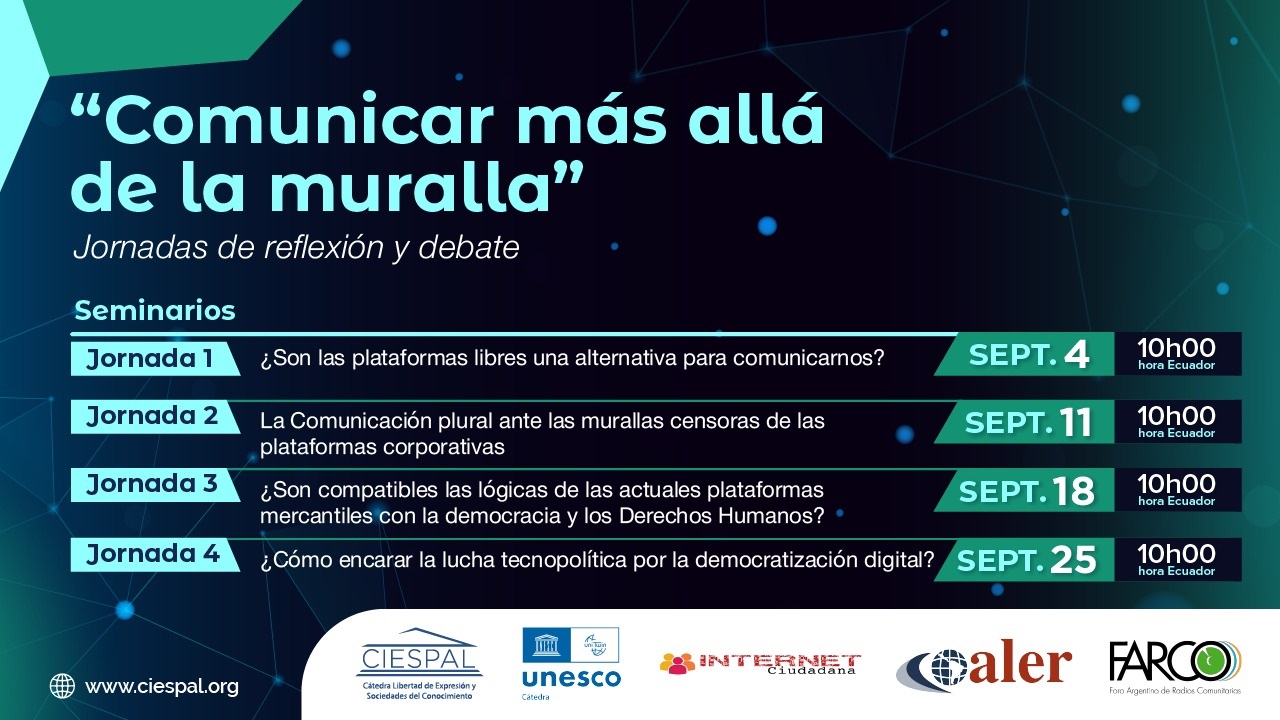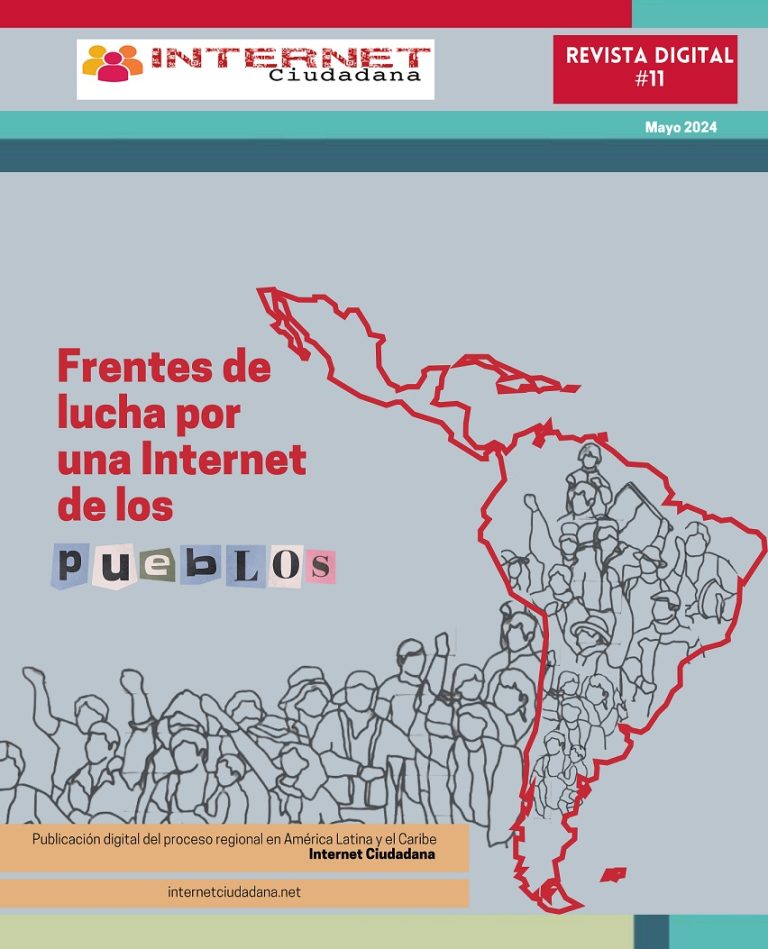
Karibu grantee partner Internet Ciudadana—a network dedicated to uniting Latin American and Caribbean organizations in building a collective agenda for a more democratic, people-centered internet—will host a series of online events titled ‘Communicating Beyond the Wall.’
These events will explore how movements and active citizens can work toward a more democratic digital future while addressing the social and political challenges posed by the monopoly of corporate digital platforms.
The events will take place throughout September, with in-person and digital meeting places for participants. The events are open to the public, and will be held in Spanish.
More information from Internet Ciudadana (in English and the original Spanish) below!
Film (hosted on the open source website “Peer Tube”) on digital rights, from @internet_ciudadana for the conference ‘Utopias or Dystopias: The Peoples of Latin America and the Caribbean in the Digital Age’.
EN: Reflection and Debate Days “Communicating Beyond the Wall”

Digital platforms, initially promoted as a means to amplify voices and overcome the physical and geographical limitations of analog communication, have become insurmountable walls, with the keys held by a handful of corporations.
Communication now faces the difficult dilemma of either submitting to these commercial logics or choosing to migrate to more free, but currently still relatively marginal, alternative spaces.
The fight for the Human Right to Communicate appears in digital environments as yet another unequal struggle, similar to the concentration in print and audiovisual media. However, it is an indispensable fight.
Proposal
To shed light on this complex challenge and, above all, to offer perspectives for overcoming it, the International Center for Higher Studies in Communication (CIESPAL), the Latin American and Caribbean space Internet Ciudadana, the Latin American Association of Popular Communication and Education (ALER), and the Argentine Forum of Community Radios (FARCO) are organizing the Reflection and Debate Days “Communicating Beyond the Wall.”
The sessions, to be held on September 4, 11, 18, and 25, will consist of four 120-minute sessions each.
- Session 1 – September 4th: “Are Free Platforms an Alternative for Communication?”
- 9 AM Central America, Mexico; 10 AM Ecuador, Peru, Colombia; 11 AM Chile, Bolivia, Venezuela, Paraguay, Caribbean; 12 PM Argentina, Brazil, Uruguay
- Session 2 – September 11th: “Plural Communication Against the Censoring Walls of Corporate Platforms.”
- 9 AM Central America, Mexico; 10 AM Ecuador, Peru, Colombia; 11 AM Chile, Bolivia, Venezuela, Paraguay, Caribbean; 12 PM Argentina, Brazil, Uruguay
- Session 3 – September 18th: “Are the Logics of Current Commercial Platforms Compatible with Democracy and Human Rights?”
- 9 AM Central America, Mexico; 10 AM Ecuador, Peru, Colombia; 11 AM Chile, Bolivia, Venezuela, Paraguay, Caribbean; 12 PM Argentina, Brazil, Uruguay
- Session 4: – September 25th “How to Tackle the Technopolitical Struggle for Digital Democratization?”
- 9 AM Central America, Mexico; 10 AM Ecuador, Peru, Colombia; 11 AM Chile, Bolivia, Venezuela, Paraguay, Caribbean; 12 PM Argentina, Brazil, Uruguay
To participate and receive connection links, register at this link.
The strategic vision underlying these sessions is the struggle for the essential democratization of Communication, particularly linked to the need for people to have access to relevant and reliable information and to express their demands and positions without being subjected to the hegemonic media agenda.
This dichotomy is now intersected by digital technology, which presents its own challenges but essentially continues the previous struggles for the Human Right to Communicate against the logic of message control and manipulation by those in power.
From this perspective, the emphasis is on strengthening our own media and platforms, which primarily focus on close or like-minded communities, while also attempting to leverage media or platforms not under our control to reach broader audiences. In this context, it is important to reveal the differing interests represented and defended by these entities.
By making this perspective clear from the start, it is considered crucial to open the debate to a diversity of viewpoints. This vision is completed by the common interest in trying to develop some answers to the question of how to create and amplify socially meaningful communication in new digital environments.
To address these issues, speakers from various sectors will offer an introductory presentation to spark further debate.
Participatory Methodology
Rather than the classic webinar format, we aim to create something more participatory and organic. To do this, we will integrate two approaches:
- Semi-in-person format: Several people will be present in the same location and connect virtually. This format allows participants to exchange ideas during the planned participatory debate moments, summarizing a couple of key points to share with the group as headlines.
- Small virtual group rooms: After the presentations, smaller virtual rooms will be opened for exchanges, with the same idea of synthesizing the discussion into a couple of key phrases.
The questions will focus on the critical points and dangers posed by the current digital system, while the responses should consider the need to think strategically about how to communicate today.
The tone will be on finding practical and everyday solutions without falling into techno-solutionism or losing sight of the social and political implications posed by the monopoly of corporate digital platforms.
Participation certificates will be issued. Register to participate at this link.
More Info
Check out Internet Ciudadana‘s new Spanish-language magazine on the “Fronts of struggle for a People’s Internet,” with views and perspectives from across the region here.

ES: Jornadas de reflexión y debate «Comunicar más allá de la muralla»
Las plataformas digitales, que se promocionaron inicialmente como la posibilidad de ampliar las voces y superar las limitaciones físicas y geográficas de la comunicación analógica, se han vuelto murallas infranqueables, cuyas llaves se encuentran en manos de un puñado de corporaciones.
La comunicación se halla ante el difícil dilema de someterse a estas lógicas mercantiles o de optar por migrar hacia espacios alternativos más libres pero hoy aún relativamente marginales.
La lucha por el Derecho Humano a Comunicar aparece, en los entornos digitales, una vez más como un enfrentamiento desigual, similar al panorama de concentración en los medios escritos y audiovisuales. Una lucha, sin embargo, indispensable.
Propuesta
Para aportar luces a este desafío complejo y, sobre todo, perspectivas de superación, el Centro Internacional de Estudios Superiores de la Comunicación (CIESPAL), el espacio latinoamericano y caribeño Internet Ciudadana, la Asociación Latinoamericana de Comunicación y Educación Popular (ALER) y el Foro Argentino de Radios Comunitarias (FARCO) impulsan la realización de las Jornadas de reflexión y debate “Comunicar más allá de la muralla”.
Las Jornadas, a realizarse los días 4, 11, 18 y 25 de septiembre, constarán de 4 sesiones de 120 minutos de duración cada una.
- Jornada 1 – 4 de septiembre: «¿Son las plataformas libres una alternativa para comunicarnos?»
- 9 h Centroamérica, México; 10 h Ecuador, Perú, Colombia; 11 h Chile, Bolivia, Venezuela, Paraguay, Caribe; 12 h Argentina, Brasil, Uruguay
- Jornada 2 – 11 de septiembre: «La Comunicación plural ante las murallas censoras de las plataformas corporativas.»
- 9 h Centroamérica, México; 10 h Ecuador, Perú, Colombia; 11 h Chile, Bolivia, Venezuela, Paraguay, Caribe; 12 h Argentina, Brasil, Uruguay
- Jornada 3 – 18 de septiembre: ¿Son compatibles las lógicas de las actuales plataformas mercantiles con la democracia y los Derechos Humanos?
- 9 h Centroamérica, México; 10 h Ecuador, Perú, Colombia; 11 h Chile, Bolivia, Venezuela, Paraguay, Caribe; 12 h Argentina, Brasil, Uruguay
- Jornada 4- 25 de septiembre: ¿Cómo encarar la lucha tecnopolítica por la democratización digital?
- 9 h Centroamérica, México; 10 h Ecuador, Perú, Colombia; 11 h Chile, Bolivia, Venezuela, Paraguay, Caribe; 12 h Argentina, Brasil, Uruguay
Para participar y recibir los enlaces de conexión, inscríbete en https://acortar.link/mH2WJf
La visión estratégica en la que se enmarcan estas Jornadas es la lucha por la indispensable democratización de la Comunicación, ligada en particular a la necesidad de que los pueblos cuenten con información relevante y confiable, y puedan a la vez expresar sus demandas y posiciones sin someterse a la agenda mediática hegemónica.
Esta dicotomía es hoy atravesada por la tecnología digital, que presenta desafíos propios, pero que en su esencia es la continuidad de las luchas anteriores por el Derecho Humano a Comunicar, frente a las lógicas de control de los mensajes y la manipulación ejercida desde el poder.
Desde esta perspectiva, el énfasis está puesto en fortalecer los medios y plataformas propios, que se enfocan mayormente en comunidades cercanas o afines, pero también en el intento de aprovechar medios o plataformas que no están bajo nuestro control, para llegar a públicos más amplios. En este sentido, cobra importancia develar la diferencia de los intereses que representan y defienden unos y otros.
Transparentando esta mirada desde el inicio, se considera clave abrir el debate a la diversidad de miradas. Completa esta visión el interés común de intentar elaborar algunas respuestas al interrogante de cómo desarrollar y amplificar una comunicación con sentido social en los nuevos entornos digitales.
Para dilucidar estas cuestiones, expositores de diversos sectores propondrán una introducción disparadora que anime al debate posterior.
Metodología participativa
Más que el formato expositivo clásico de los webinarios, nos proponemos hacer algo más participativo y orgánico. Para ello, se integrarán dos variantes:
- Formato semi-presencial: en el que están presentes varias personas en el mismo lugar, desde donde se conectan virtualmente. Esta variante da la posibilidad de que en los momentos previstos para el debate participativo, los asistentes intercambien entre ellos, extrayendo un par de ideas fuerza a compartir con el conjunto, a modo de titulares.
- Formato de salas virtuales grupales: en este formato, luego de las exposiciones, se habilitan salas virtuales más pequeñas, en las que se procede al intercambio, con la misma idea de sintetizar en un par de frases lo conversado.
Los interrogantes se centrarán en los puntos críticos y los peligros que supone el actual sistema digital, mientras que las respuestas debieran tener en cuenta la necesidad de pensar estratégicamente cómo hacer comunicación hoy.
La tónica es enfocarse en salidas de aplicación práctica y cotidiana, sin caer en tecnosolucionismos ni perder de vista las implicancias sociales y políticas que plantea el monopolio de las plataformas digitales corporativas.
Para participar y recibir los enlaces de conexión, inscríbete en https://acortar.link/mH2WJf
